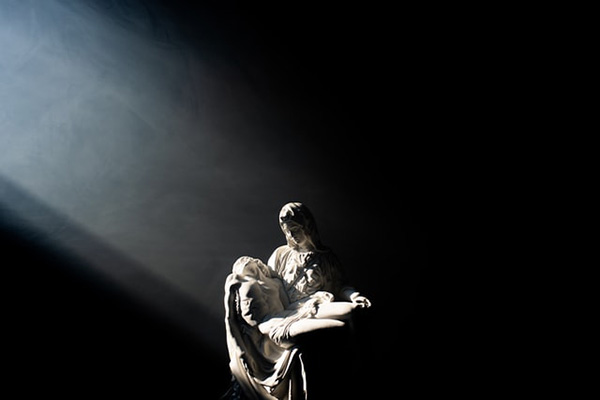The Necessary Pain of Grief and Healing
- JENNY DUBAY
Allowing ourselves to feel suffering is the only way to heal from suffering.

When my husband was a teenager, he was involved in a devastating auto accident that nearly took his life. Despite the crumpled mess of his car, despite the fact that his windshield was shattered on the asphalt because he'd been hurled through it, despite the fact that he was shattered on the asphalt, wrecked next to the wreckage, he felt little if any pain. His entire body was in shock, and he soon became unconscious from the extent of his injuries.
It wasn't until later, safely stabilized, operations complete, lying in hospital recovery, that the agony hit him. And it hit hard. The path to healing was excruciating, yet it was also necessary. If he hadn't felt pain, that would have meant he was paralyzed and would never walk again.
If he hadn't felt pain, something would have been seriously, tragically wrong.
The only present-day reminders of such a traumatic experience are scars which have now faded into barely-noticeable white marks on his skin. I quite like them, to be honest—I see them as battle wounds of strength.
Walking through fire is agonizing, but it's the only way out.
Healing is like that. Walking through fire is agonizing, but it's the only way out. If we don't face our pain head-on, if we try to avoid it, we're delaying the inevitable—and in the long run, we'll end up causing ourselves more suffering.
When we try to avoid pain, we cause ourselves more pain.
We've all experienced trauma, tragedy, disappointment, heartbreak, and even betrayal. These experiences of suffering aren't what God wants for us, but due to original sin they're very real aspects of the human experience. No matter what our wound, whether it's based in shame or shock, tragedy or turmoil, there's a common foundation.
Grief.
I've certainly experienced my fair share of suffering. I now struggle to recapture the optimistic spirit I once had—to recover hope, joy, and peace.
Grief is stuck inside my chest. I can feel it physically, like a deep, buried, exhausting weight. The emotional often becomes physical. Sometimes it takes the form of heart palpitations or, when it decides to change slightly, it'll ooze down into my stomach in raw dread. At other times it travels up, choking my throat until it reaches my head in sharp, piercing agony.
Yet whether it takes the form of head or heart, dread or despair, fear and anxiety, or an exhaustion so deep I can barely move, at its core it's always this one thing.
Grief.
The human response to trauma is about the loss of connection—the loss of connection to our identity, our bodies, our memories, and to the people surrounding us in our lives. Trauma has the capacity to undermine our sense of self, feelings of well-being, and connection to life. (Patrick Carnes, The Betrayal Bond)
I don't need to share my personal story, because my details don't matter—we all have our own stories to tell. What really matters aren't the details, but the healing graces of God's love. We need to learn how to embrace His trust in us so we can trust in Him (and others). We need to reach an understanding of the incredible yet sadly misunderstood power of charity.
True charity is authentic love.
Charity doesn't mean giving your old jeans to Goodwill because you ate too many chocolates, or even donating a few dollars to the collection basket during Sunday Mass. True charity is authentic love; it's a developing of self to the point that self merges with the goodness of others, of allowing oneself to be vulnerable enough to enjoy true fellowship and relationship, to recognize the image and likeness of God in others, no matter how different they may be from us. True charity is loving the other for the sake of their beautiful selves, and not for the sake of our own egoistic needs. True charity is also the ability to give freely in order to accept freely. It's the ability to fully receive God as He appears through the gifts of humanity.
True charity is love of others, which begins with love of self. And loving self is the definition of authentic healing.
My grief, and the subsequent loss of connection with self and others, has been a slow awakening. A healing has begun, and I shiver with the pain of the process. It hurts. A lot. But I will get through this, and I will get through it with love; love of self, love of God, and a renewed trust in others. I know that without charity, I'm nothing more than a noisy gong or a clanging cymbal.
And who wants to be that?
God the Father told St. Caterina of Siena in a mystical vision: "The soul cannot live without love. She always wants to love something, becuase she is made of love, and through love I created her."
- We've been made for love. That's how our Father designed us, and how He designed us to heal.
Thawing from the effects of trauma is a painful process. Allowing those battered and numbed emotions to come to life again—welcoming the grief to enter—can feel overwhelming at times.
Yet if we don't feel the pain, that means we're paralyzed. If we don't feel the pain, that means there's something seriously, tragically wrong.
Because allowing ourselves to feel suffering is the only way to heal from our suffering.
The most profound and joyous miracle of Jesus' earthly life was the Resurrection.
The Resurrection could never have happened without the excruciating agony of the Crucifixion.
God doesn't rescue us from every tragedy in our lives. That's not how it works in this fallen world. He doesn't rescue us from suffering, but He does walk with us, through the heart of the storm, so we can reach our own personal resurrection.
Humanity killed Christ, but God the Father raised Him from the dead. God can do the same for all of us who are suffering from grief, isolation, loneliness, distress, trauma, tragedy, fear and pain—if we allow ourselves to accept the love He so desperately wants to give us.
From pain comes resurrection and a glorious, gorgeous new beginning.
 This is J. Fraser Field, Founder of CERC. I hope you appreciated this piece. We curate these articles especially for believers like you.
This is J. Fraser Field, Founder of CERC. I hope you appreciated this piece. We curate these articles especially for believers like you.
Please show your appreciation by making a $3 donation. CERC is entirely reader supported.

Acknowledgement
 Jenny duBay. "The Necessary Pain of Grief and Healing." Missio Dei (June 27, 2022).
Jenny duBay. "The Necessary Pain of Grief and Healing." Missio Dei (June 27, 2022).
Reprinted with permission from the author. Image credit: Photo by Grant Whitty on Unsplash.
The Author
As a domestic abuser survivor, advocate, and author, Jenny duBay knows what a huge impact intimate partner violence (IPV) has on an individual. She founded Create Soul Space to help cultivate awareness of domestic violence within a Catholic setting. Jenny is associated with Catholics for Family Peace and works with various organizations within the Catholic Church to spiritually support victims and survivors of domestic violence. Author of the Create Soul Space and Prodigal Parishioner blogs, Jenny also writes for Missio Dei along with various other Catholic publications. Her upcoming book Don't Plant Your Seeds Among Thorns: A Catholic's Guide to Domestic Abuse will be published soon.
Copyright © 2022

